On July 22, 2025, the European police agency Europol said a long-running investigation led by the French Police resulted in the arrest of a 38-year-old administrator of XSS, a Russian-language cybercrime forum with more than 50,000 members. The action has triggered an ongoing frenzy of speculation and panic among XSS denizens about the identity of the unnamed suspect, but the consensus is that he is a pivotal figure in the crime forum scene who goes by the hacker handle “Toha.” Here’s a deep dive on what’s knowable about Toha, and a short stab at who got nabbed.

An unnamed 38-year-old man was arrested in Kiev last month on suspicion of administering the cybercrime forum XSS. Image: ssu.gov.ua.
Europol did not name the accused, but published partially obscured photos of him from the raid on his residence in Kiev. The police agency said the suspect acted as a trusted third party — arbitrating disputes between criminals — and guaranteeing the security of transactions on XSS. A statement from Ukraine’s SBU security service said XSS counted among its members many cybercriminals from various ransomware groups, including REvil, LockBit, Conti, and Qiliin.
Since the Europol announcement, the XSS forum resurfaced at a new address on the deep web (reachable only via the anonymity network Tor). But from reviewing the recent posts, there appears to be little consensus among longtime members about the identity of the now-detained XSS administrator.
The most frequent comment regarding the arrest was a message of solidarity and support for Toha, the handle chosen by the longtime administrator of XSS and several other major Russian forums. Toha’s accounts on other forums have been silent since the raid.
Europol said the suspect has enjoyed a nearly 20-year career in cybercrime, which roughly lines up with Toha’s history. In 2005, Toha was a founding member of the Russian-speaking forum Hack-All. That is, until it got massively hacked a few months after its debut. In 2006, Toha rebranded the forum to exploit[.]in, which would go on to draw tens of thousands of members, including an eventual Who’s-Who of wanted cybercriminals.
Toha announced in 2018 that he was selling the Exploit forum, prompting rampant speculation on the forums that the buyer was secretly a Russian or Ukrainian government entity or front person. However, those suspicions were unsupported by evidence, and Toha vehemently denied the forum had been given over to authorities.
One of the oldest Russian-language cybercrime forums was DaMaGeLaB, which operated from 2004 to 2017, when its administrator “Ar3s” was arrested. In 2018, a partial backup of the DaMaGeLaB forum was reincarnated as xss[.]is, with Toha as its stated administrator.
Clues about Toha’s early presence on the Internet — from ~2004 to 2010 — are available in the archives of Intel 471, a cyber intelligence firm that tracks forum activity. Intel 471 shows Toha used the same email address across multiple forum accounts, including at Exploit, Antichat, Carder[.]su and inattack[.]ru.
DomainTools.com finds Toha’s email address — toschka2003@yandex.ru — was used to register at least a dozen domain names — most of them from the mid- to late 2000s. Apart from exploit[.]in and a domain called ixyq[.]com, the other domains registered to that email address end in .ua, the top-level domain for Ukraine (e.g. deleted.org[.]ua, lj.com[.]ua, and blogspot.org[.]ua).
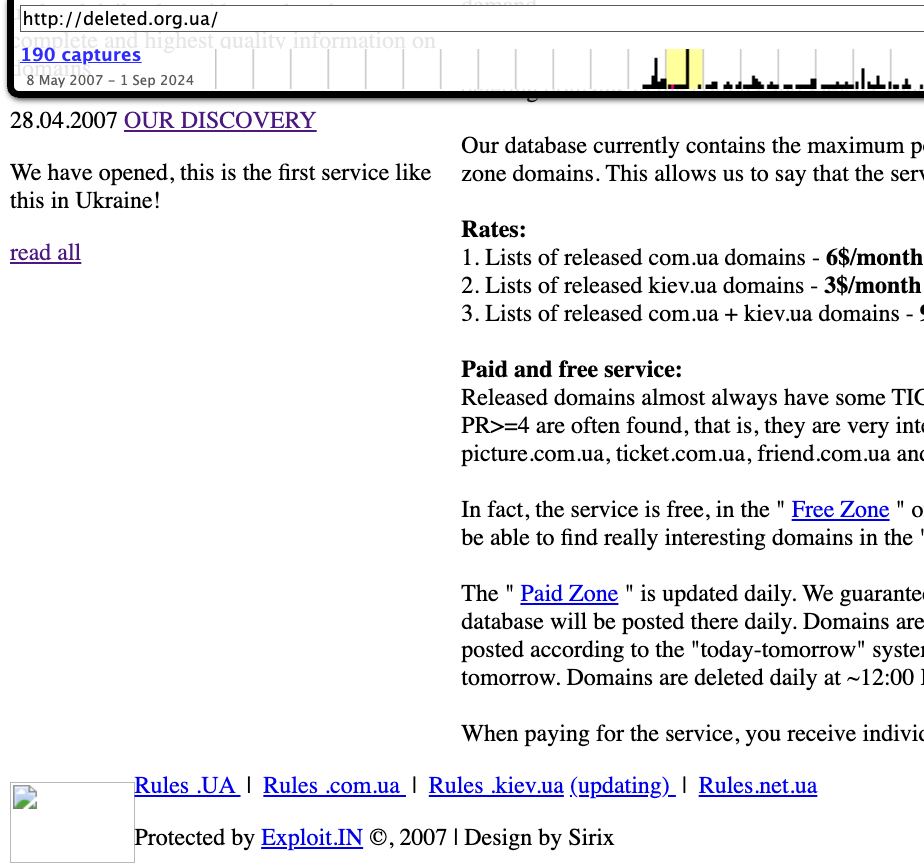
A 2008 snapshot of a domain registered to toschka2003@yandex.ru and to Anton Medvedovsky in Kiev. Note the message at the bottom left, “Protected by Exploit,in.” Image: archive.org.
Nearly all of the domains registered to toschka2003@yandex.ru contain the name Anton Medvedovskiy in the registration records, except for the aforementioned ixyq[.]com, which is registered to the name Yuriy Avdeev in Moscow.
This Avdeev surname came up in a lengthy conversation with Lockbitsupp, the leader of the rapacious and destructive ransomware affiliate group Lockbit. The conversation took place in February 2024, when Lockbitsupp asked for help identifying Toha’s real-life identity.
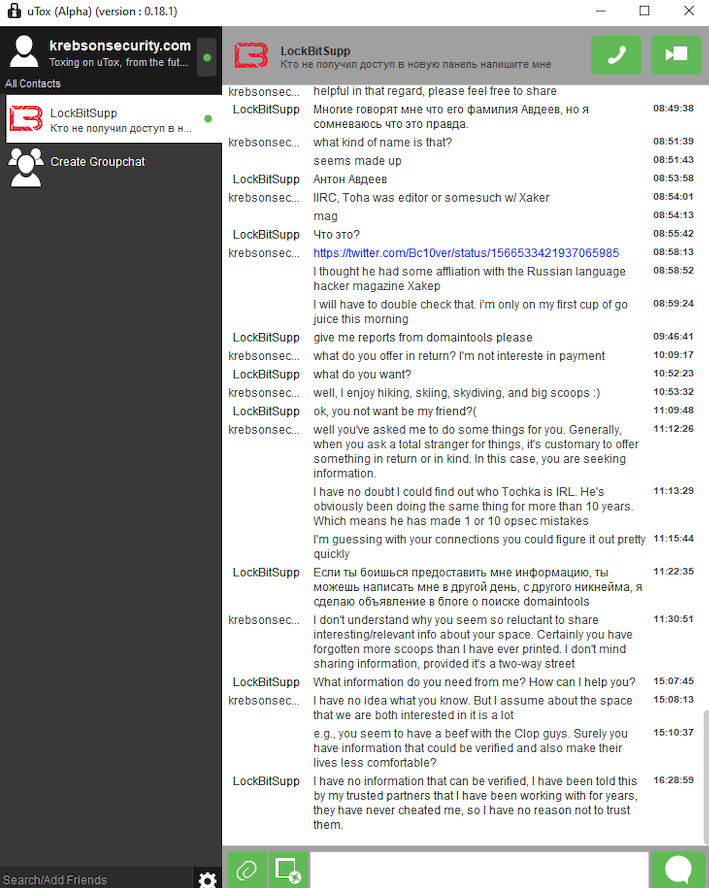
In early 2024, the leader of the Lockbit ransomware group — Lockbitsupp — asked for help investigating the identity of the XSS administrator Toha, which he claimed was a Russian man named Anton Avdeev.
Lockbitsupp didn’t share why he wanted Toha’s details, but he maintained that Toha’s real name was Anton Avdeev. I declined to help Lockbitsupp in whatever revenge he was planning on Toha, but his question made me curious to look deeper.
It appears Lockbitsupp’s query was based on a now-deleted Twitter post from 2022, when a user by the name “3xp0rt” asserted that Toha was a Russian man named Anton Viktorovich Avdeev, born October 27, 1983.
Searching the web for Toha’s email address toschka2003@yandex.ru reveals a 2010 sales thread on the forum bmwclub.ru where a user named Honeypo was selling a 2007 BMW X5. The ad listed the contact person as Anton Avdeev and gave the contact phone number 9588693.
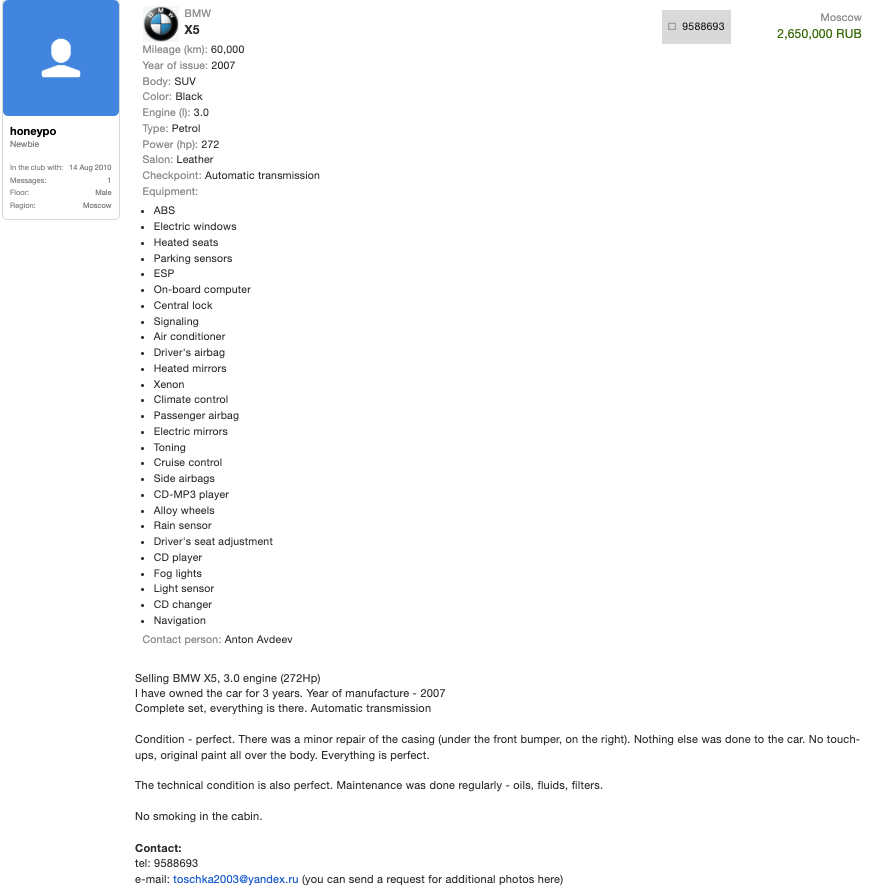
A search on the phone number 9588693 in the breach tracking service Constella Intelligence finds plenty of official Russian government records with this number, date of birth and the name Anton Viktorovich Avdeev. For example, hacked Russian government records show this person has a Russian tax ID and SIN (Social Security number), and that they were flagged for traffic violations on several occasions by Moscow police; in 2004, 2006, 2009, and 2014.
Astute readers may have noticed by now that the ages of Mr. Avdeev (41) and the XSS admin arrested this month (38) are a bit off. This would seem to suggest that the person arrested is someone other than Mr. Avdeev, who did not respond to requests for comment.
For further insight on this question, KrebsOnSecurity sought comments from Sergeii Vovnenko, a former cybercriminal from Ukraine who now works at the security startup paranoidlab.com. I reached out to Vovnenko because for several years beginning around 2010 he was the owner and operator of thesecure[.]biz, an encrypted “Jabber” instant messaging server that Europol said was operated by the suspect arrested in Kiev. Thesecure[.]biz grew quite popular among many of the top Russian-speaking cybercriminals because it scrupulously kept few records of its users’ activity, and its administrator was always a trusted member of the community.
The reason I know this historic tidbit is that in 2013, Vovnenko — using the hacker nicknames “Fly,” and “Flycracker” — hatched a plan to have a gram of heroin purchased off of the Silk Road darknet market and shipped to our home in Northern Virginia. The scheme was to spoof a call from one of our neighbors to the local police, saying this guy Krebs down the street was a druggie who was having narcotics delivered to his home.
I happened to be lurking on Flycracker’s private cybercrime forum when his heroin-framing plan was carried out, and called the police myself before the smack eventually arrived in the U.S. Mail. Vovnenko was later arrested for unrelated cybercrime activities, extradited to the United States, convicted, and deported after a 16-month stay in the U.S. prison system [on several occasions, he has expressed heartfelt apologies for the incident, and we have since buried the hatchet].
Vovnenko said he purchased a device for cloning credit cards from Toha in 2009, and that Toha shipped the item from Russia. Vovnenko explained that he (Flycracker) was the owner and operator of thesecure[.]biz from 2010 until his arrest in 2014.
Vovnenko believes thesecure[.]biz was stolen while he was in jail, either by Toha and/or an XSS administrator who went by the nicknames N0klos and Sonic.
“When I was in jail, [the] admin of xss.is stole that domain, or probably N0klos bought XSS from Toha or vice versa,” Vovnenko said of the Jabber domain. “Nobody from [the forums] spoke with me after my jailtime, so I can only guess what really happened.”
N0klos was the owner and administrator of an early Russian-language cybercrime forum known as Darklife[.]ws. However, N0kl0s also appears to be a lifelong Russian resident, and in any case seems to have vanished from Russian cybercrime forums several years ago.
Asked whether he believes Toha was the XSS administrator who was arrested this month in Ukraine, Vovnenko maintained that Toha is Russian, and that “the French cops took the wrong guy.”
So who did the Ukrainian police arrest in response to the investigation by the French authorities? It seems plausible that the BMW ad invoking Toha’s email address and the name and phone number of a Russian citizen was simply misdirection on Toha’s part — intended to confuse and throw off investigators. Perhaps this even explains the Avdeev surname surfacing in the registration records from one of Toha’s domains.
But sometimes the simplest answer is the correct one. “Toha” is a common Slavic nickname for someone with the first name “Anton,” and that matches the name in the registration records for more than a dozen domains tied to Toha’s toschka2003@yandex.ru email address: Anton Medvedovskiy.
Constella Intelligence finds there is an Anton Gannadievich Medvedovskiy living in Kiev who will be 38 years old in December. This individual owns the email address itsmail@i.ua, as well an an Airbnb account featuring a profile photo of a man with roughly the same hairline as the suspect in the blurred photos released by the Ukrainian police. Mr. Medvedovskiy did not respond to a request for comment.
My take on the takedown is that the Ukrainian authorities likely arrested Medvedovskiy. Toha shared on DaMaGeLab in 2005 that he had recently finished the 11th grade and was studying at a university — a time when Mevedovskiy would have been around 18 years old. On Dec. 11, 2006, fellow Exploit members wished Toha a happy birthday. Records exposed in a 2022 hack at the Ukrainian public services portal diia.gov.ua show that Mr. Medvedovskiy’s birthday is Dec. 11, 1987.
The law enforcement action and resulting confusion about the identity of the detained has thrown the Russian cybercrime forum scene into disarray in recent weeks, with lengthy and heated arguments about XSS’s future spooling out across the forums.
XSS relaunched on a new Tor address shortly after the authorities plastered their seizure notice on the forum’s homepage, but all of the trusted moderators from the old forum were dismissed without explanation. Existing members saw their forum account balances drop to zero, and were asked to plunk down a deposit to register at the new forum. The new XSS “admin” said they were in contact with the previous owners and that the changes were to help rebuild security and trust within the community.
However, the new admin’s assurances appear to have done little to assuage the worst fears of the forum’s erstwhile members, most of whom seem to be keeping their distance from the relaunched site for now.
Indeed, if there is one common understanding amid all of these discussions about the seizure of XSS, it is that Ukrainian and French authorities now have several years worth of private messages between XSS forum users, as well as contact rosters and other user data linked to the seized Jabber server.
“The myth of the ‘trusted person’ is shattered,” the user “GordonBellford” cautioned on Aug. 3 in an Exploit forum thread about the XSS admin arrest. “The forum is run by strangers. They got everything. Two years of Jabber server logs. Full backup and forum database.”
GordonBellford continued:
And the scariest thing is: this data array is not just an archive. It is material for analysis that has ALREADY BEEN DONE . With the help of modern tools, they see everything:
Graphs of your contacts and activity.
Relationships between nicknames, emails, password hashes and Jabber ID.
Timestamps, IP addresses and digital fingerprints.
Your unique writing style, phraseology, punctuation, consistency of grammatical errors, and even typical typos that will link your accounts on different platforms.They are not looking for a needle in a haystack. They simply sifted the haystack through the AI sieve and got ready-made dossiers.
The FBI joined authorities across Europe last week in seizing domain names for Cracked and Nulled, English-language cybercrime forums with millions of users that trafficked in stolen data, hacking tools and malware. An investigation into the history of these communities shows their apparent co-founders quite openly operate an Internet service provider and a pair of e-commerce platforms catering to buyers and sellers on both forums.

In this 2019 post from Cracked, a forum moderator told the author of the post (Buddie) that the owner of the RDP service was the founder of Nulled, a.k.a. “Finndev.” Image: Ke-la.com.
On Jan. 30, the U.S. Department of Justice said it seized eight domain names that were used to operate Cracked, a cybercrime forum that sprang up in 2018 and attracted more than four million users. The DOJ said the law enforcement action, dubbed Operation Talent, also seized domains tied to Sellix, Cracked’s payment processor.
In addition, the government seized the domain names for two popular anonymity services that were heavily advertised on Cracked and Nulled and allowed customers to rent virtual servers: StarkRDP[.]io, and rdp[.]sh.
Those archived webpages show both RDP services were owned by an entity called 1337 Services Gmbh. According to corporate records compiled by Northdata.com, 1337 Services GmbH is also known as AS210558 and is incorporated in Hamburg, Germany.
The Cracked forum administrator went by the nicknames “FlorainN” and “StarkRDP” on multiple cybercrime forums. Meanwhile, a LinkedIn profile for a Florian M. from Germany refers to this person as the co-founder of Sellix and founder of 1337 Services GmbH.
Northdata’s business profile for 1337 Services GmbH shows the company is controlled by two individuals: 32-year-old Florian Marzahl and Finn Alexander Grimpe, 28.
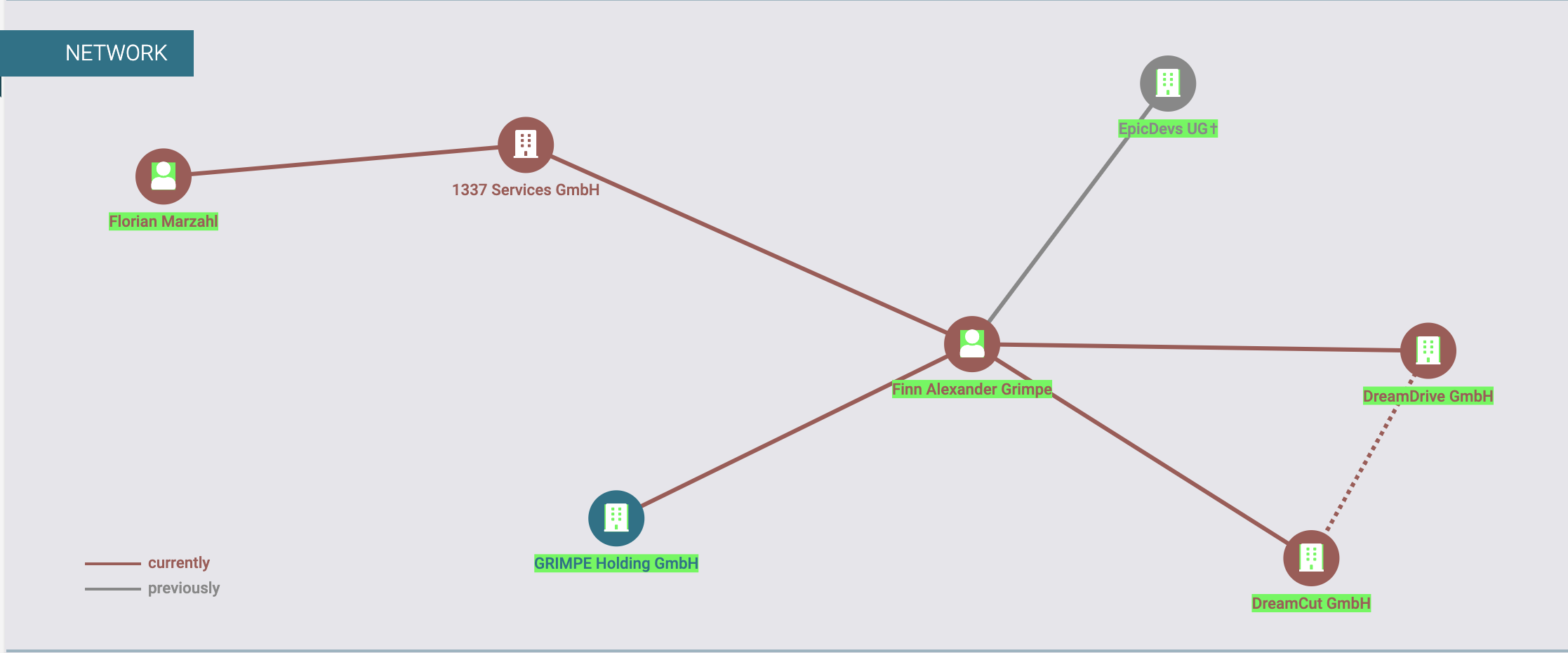
An organization chart showing the owners of 1337 Services GmbH as Florian Marzahl and Finn Grimpe. Image: Northdata.com.
Neither Marzahl nor Grimpe responded to requests for comment. But Grimpe’s first name is interesting because it corresponds to the nickname chosen by the founder of Nulled, who goes by the monikers “Finn” and “Finndev.” NorthData reveals that Grimpe was the founder of a German entity called DreamDrive GmbH, which rented out high-end sports cars and motorcycles.
According to the cyber intelligence firm Intel 471, a user named Finndev registered on multiple cybercrime forums, including Raidforums [seized by the FBI in 2022], Void[.]to, and vDOS, a DDoS-for-hire service that was shut down in 2016 after its founders were arrested.
The email address used for those accounts was f.grimpe@gmail.com. DomainTools.com reports f.grimpe@gmail.com was used to register at least nine domain names, including nulled[.]lol and nulled[.]it. Neither of these domains were among those seized in Operation Talent.
Intel471 finds the user FlorainN registered across multiple cybercrime forums using the email address olivia.messla@outlook.de. The breach tracking service Constella Intelligence says this email address used the same password (and slight variations of it) across many accounts online — including at hacker forums — and that the same password was used in connection with dozens of other email addresses, such as florianmarzahl@hotmail.de, and fmarzahl137@gmail.com.
The Justice Department said the Nulled marketplace had more than five million members, and has been selling stolen login credentials, stolen identification documents and hacking services, as well as tools for carrying out cybercrime and fraud, since 2016.
Perhaps fittingly, both Cracked and Nulled have been hacked over the years, exposing countless private messages between forum users. A review of those messages archived by Intel 471 showed that dozens of early forum members referred privately to Finndev as the owner of shoppy[.]gg, an e-commerce platform that caters to the same clientele as Sellix.
Shoppy was not targeted as part of Operation Talent, and its website remains online. Northdata reports that Shoppy’s business name — Shoppy Ecommerce Ltd. — is registered at an address in Gan-Ner, Israel, but there is no ownership information about this entity. Shoppy did not respond to requests for comment.
Constella found that a user named Shoppy registered on Cracked in 2019 using the email address finn@shoppy[.]gg. Constella says that email address is tied to a Twitter/X account for Shoppy Ecommerce in Israel.
The DOJ said one of the alleged administrators of Nulled, a 29-year-old Argentinian national named Lucas Sohn, was arrested in Spain. The government has not announced any other arrests or charges associated with Operation Talent.
Indeed, both StarkRDP and FloraiN have posted to their accounts on Telegram that there were no charges levied against the proprietors of 1337 Services GmbH. FlorainN told former customers they were in the process of moving to a new name and domain for StarkRDP, where existing accounts and balances would be transferred.
“StarkRDP has always been operating by the law and is not involved in any of these alleged crimes and the legal process will confirm this,” the StarkRDP Telegram account wrote on January 30. “All of your servers are safe and they have not been collected in this operation. The only things that were seized is the website server and our domain. Unfortunately, no one can tell who took it and with whom we can talk about it. Therefore, we will restart operation soon, under a different name, to close the chapter [of] ‘StarkRDP.'”
The FBI and authorities in The Netherlands this week seized dozens of servers and domains for a hugely popular spam and malware dissemination service operating out of Pakistan. The proprietors of the service, who use the collective nickname “The Manipulaters,” have been the subject of three stories published here since 2015. The FBI said the main clientele are organized crime groups that try to trick victim companies into making payments to a third party.
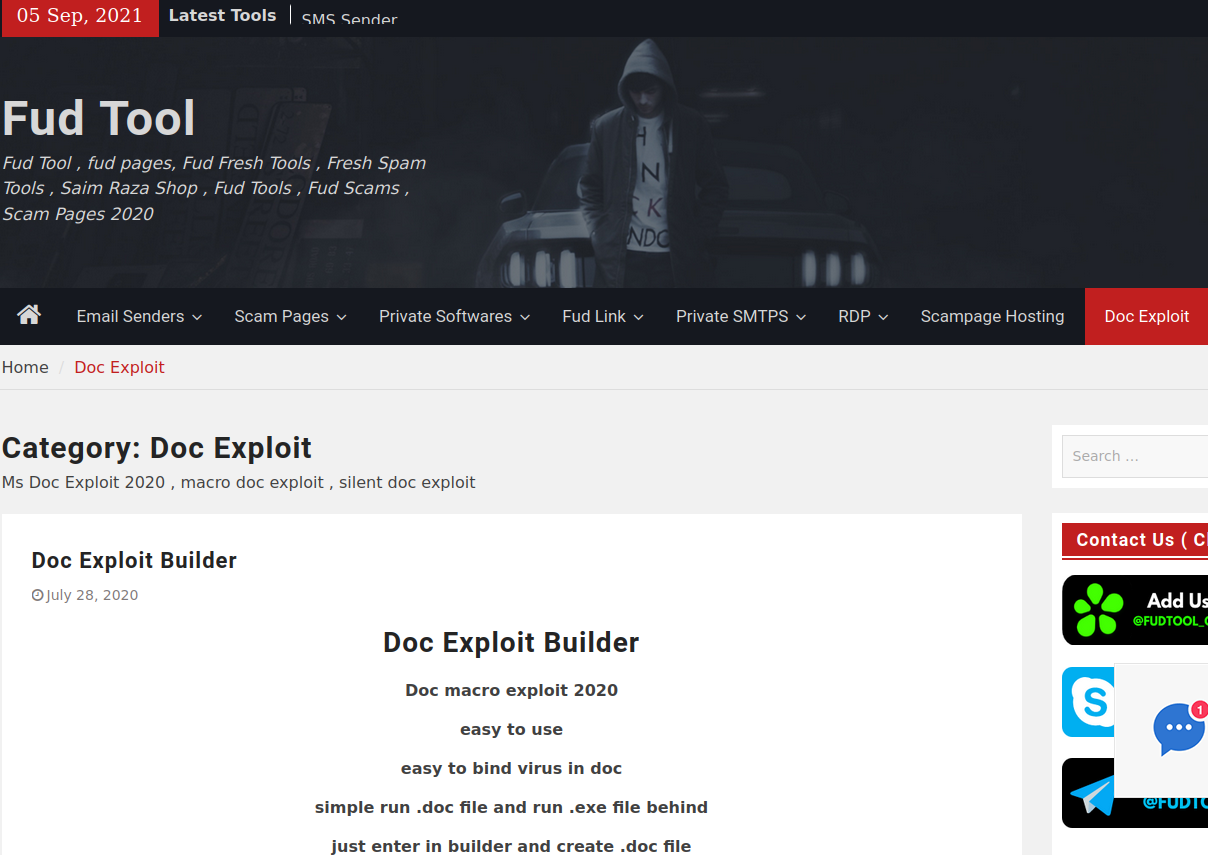
One of several current Fudtools sites run by the principals of The Manipulators.
On January 29, the FBI and the Dutch national police seized the technical infrastructure for a cybercrime service marketed under the brands Heartsender, Fudpage and Fudtools (and many other “fud” variations). The “fud” bit stands for “Fully Un-Detectable,” and it refers to cybercrime resources that will evade detection by security tools like antivirus software or anti-spam appliances.
The Dutch authorities said 39 servers and domains abroad were seized, and that the servers contained millions of records from victims worldwide — including at least 100,000 records pertaining to Dutch citizens.
A statement from the U.S. Department of Justice refers to the cybercrime group as Saim Raza, after a pseudonym The Manipulaters communally used to promote their spam, malware and phishing services on social media.
“The Saim Raza-run websites operated as marketplaces that advertised and facilitated the sale of tools such as phishing kits, scam pages and email extractors often used to build and maintain fraud operations,” the DOJ explained.
The core Manipulaters product is Heartsender, a spam delivery service whose homepage openly advertised phishing kits targeting users of various Internet companies, including Microsoft 365, Yahoo, AOL, Intuit, iCloud and ID.me, to name a few.
The government says transnational organized crime groups that purchased these services primarily used them to run business email compromise (BEC) schemes, wherein the cybercrime actors tricked victim companies into making payments to a third party.
“Those payments would instead be redirected to a financial account the perpetrators controlled, resulting in significant losses to victims,” the DOJ wrote. “These tools were also used to acquire victim user credentials and utilize those credentials to further these fraudulent schemes. The seizure of these domains is intended to disrupt the ongoing activity of these groups and stop the proliferation of these tools within the cybercriminal community.”
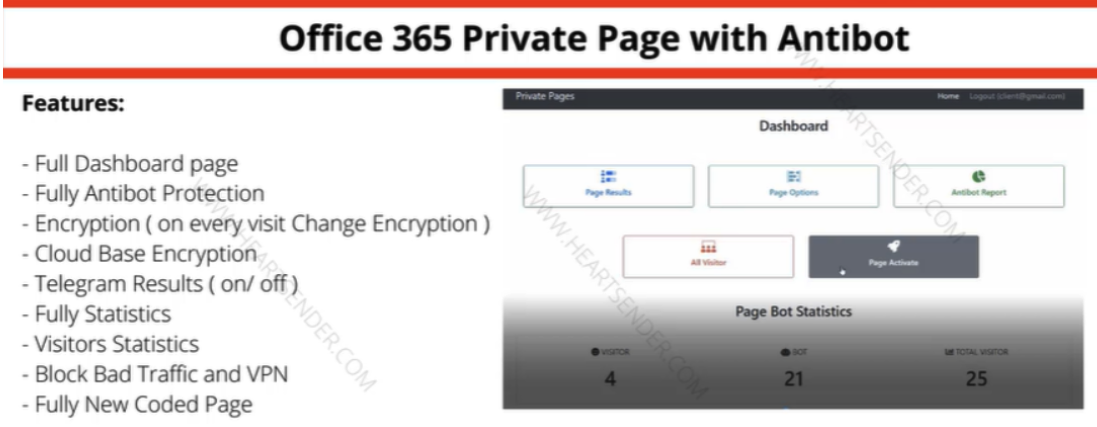
Manipulaters advertisement for “Office 365 Private Page with Antibot” phishing kit sold via Heartsender. “Antibot” refers to functionality that attempts to evade automated detection techniques, keeping a phish deployed and accessible as long as possible. Image: DomainTools.
KrebsOnSecurity first wrote about The Manipulaters in May 2015, mainly because their ads at the time were blanketing a number of popular cybercrime forums, and because they were fairly open and brazen about what they were doing — even who they were in real life.
We caught up with The Manipulaters again in 2021, with a story that found the core employees had started a web coding company in Lahore called WeCodeSolutions — presumably as a way to account for their considerable Heartsender income. That piece examined how WeCodeSolutions employees had all doxed themselves on Facebook by posting pictures from company parties each year featuring a large cake with the words FudCo written in icing.
A follow-up story last year about The Manipulaters prompted messages from various WeCodeSolutions employees who pleaded with this publication to remove stories about them. The Saim Raza identity told KrebsOnSecurity they were recently released from jail after being arrested and charged by local police, although they declined to elaborate on the charges.
The Manipulaters never seemed to care much about protecting their own identities, so it’s not surprising that they were unable or unwilling to protect their own customers. In an analysis released last year, DomainTools.com found the web-hosted version of Heartsender leaked an extraordinary amount of user information to unauthenticated users, including customer credentials and email records from Heartsender employees.

Almost every year since their founding, The Manipulaters have posted a picture of a FudCo cake from a company party celebrating its anniversary.
DomainTools also uncovered evidence that the computers used by The Manipulaters were all infected with the same password-stealing malware, and that vast numbers of credentials were stolen from the group and sold online.
“Ironically, the Manipulaters may create more short-term risk to their own customers than law enforcement,” DomainTools wrote. “The data table ‘User Feedbacks’ (sic) exposes what appear to be customer authentication tokens, user identifiers, and even a customer support request that exposes root-level SMTP credentials–all visible by an unauthenticated user on a Manipulaters-controlled domain.”
Police in The Netherlands said the investigation into the owners and customers of the service is ongoing.
“The Cybercrime Team is on the trail of a number of buyers of the tools,” the Dutch national police said. “Presumably, these buyers also include Dutch nationals. The investigation into the makers and buyers of this phishing software has not yet been completed with the seizure of the servers and domains.”
U.S. authorities this week also joined law enforcement in Australia, France, Greece, Italy, Romania and Spain in seizing a number of domains for several long-running cybercrime forums and services, including Cracked and Nulled. According to a statement from the European police agency Europol, the two communities attracted more than 10 million users in total.
Other domains seized as part of “Operation Talent” included Sellix, an e-commerce platform that was frequently used by cybercrime forum members to buy and sell illicit goods and services.
SSH Private Key Looting Wordlists. A Collection Of Wordlists To Aid In Locating Or Brute-Forcing SSH Private Key File Names.
?file=../../../../../../../../home/user/.ssh/id_rsa
?file=../../../../../../../../home/user/.ssh/id_rsa-cert
This repository contains a collection of wordlists to aid in locating or brute-forcing SSH private key file names. These wordlists can be useful for penetration testers, security researchers, and anyone else interested in assessing the security of SSH configurations.
These wordlists can be used with tools such as Burp Intruder, Hydra, custom python scripts, or any other bruteforcing tool that supports custom wordlists. They can help expand the scope of your brute-forcing or enumeration efforts when targeting SSH private key files.
This wordlist repository was inspired by John Hammond in his vlog "Don't Forget This One Hacking Trick."
Please use these wordlists responsibly and only on systems you are authorized to test. Unauthorized use is illegal.
Airgorah is a WiFi auditing software that can discover the clients connected to an access point, perform deauthentication attacks against specific clients or all the clients connected to it, capture WPA handshakes, and crack the password of the access point.
It is written in Rust and uses GTK4 for the graphical part. The software is mainly based on aircrack-ng tools suite.
⭐ Don't forget to put a star if you like the project!
This software only works on linux and requires root privileges to run.
You will also need a wireless network card that supports monitor mode and packet injection.
The installation instructions are available here.
The documentation about the usage of the application is available here.
This project is released under MIT license.
If you have any question about the usage of the application, do not hesitate to open a discussion
If you want to report a bug or provide a feature, do not hesitate to open an issue or submit a pull request
This program is a tool written in Python to recover the pre-shared key of a WPA2 WiFi network without any de-authentication or requiring any clients to be on the network. It targets the weakness of certain access points advertising the PMKID value in EAPOL message 1.
python pmkidcracker.py -s <SSID> -ap <APMAC> -c <CLIENTMAC> -p <PMKID> -w <WORDLIST> -t <THREADS(Optional)>
NOTE: apmac, clientmac, pmkid must be a hexstring, e.g b8621f50edd9
The two main formulas to obtain a PMKID are as follows:
This is just for understanding, both are already implemented in find_pw_chunk and calculate_pmkid.
Below are the steps to obtain the PMKID manually by inspecting the packets in WireShark.
*You may use Hcxtools or Bettercap to quickly obtain the PMKID without the below steps. The manual way is for understanding.
To obtain the PMKID manually from wireshark, put your wireless antenna in monitor mode, start capturing all packets with airodump-ng or similar tools. Then connect to the AP using an invalid password to capture the EAPOL 1 handshake message. Follow the next 3 steps to obtain the fields needed for the arguments.
Open the pcap in WireShark:
wlan_rsna_eapol.keydes.msgnr == 1 in WireShark to display only EAPOL message 1 packets.If access point is vulnerable, you should see the PMKID value like the below screenshot:
This tool is for educational and testing purposes only. Do not use it to exploit the vulnerability on any network that you do not own or have permission to test. The authors of this script are not responsible for any misuse or damage caused by its use.
PassBreaker is a command-line password cracking tool developed in Python. It allows you to perform various password cracking techniques such as wordlist-based attacks and brute force attacks.
Clone the repository:
git clone https://github.com/HalilDeniz/PassBreaker.gitInstall the required dependencies:
pip install -r requirements.txtpython passbreaker.py <password_hash> <wordlist_file> [--algorithm]Replace <password_hash> with the target password hash and <wordlist_file> with the path to the wordlist file containing potential passwords.
--algorithm <algorithm>: Specify the hash algorithm to use (e.g., md5, sha256, sha512).-s, --salt <salt>: Specify a salt value to use.-p, --parallel: Enable parallel processing for faster cracking.-c, --complexity: Evaluate password complexity before cracking.-b, --brute-force: Perform a brute force attack.--min-length <min_length>: Set the minimum password length for brute force attacks.--max-length <max_length>: Set the maximum password length for brute force attacks.--character-set <character_set>: Set the character set to use for brute force attacks.Elbette! İşte İngilizce olarak yazılmış başlık ve küçük bir bilgi ile daha fazla kullanım örneği:
python passbreaker.py 5f4dcc3b5aa765d61d8327deb882cf99 passwords.txt --algorithm md5This command attempts to crack the password with the hash value "5f4dcc3b5aa765d61d8327deb882cf99" using the MD5 algorithm and a wordlist from the "passwords.txt" file.
python passbreaker.py 5f4dcc3b5aa765d61d8327deb882cf99 --brute-force --min-length 6 --max-length 8 --character-set abc123This command performs a brute force attack to crack the password with the hash value "5f4dcc3b5aa765d61d8327deb882cf99" by trying all possible combinations of passwords with a length between 6 and 8 characters, using the character set "abc123".
python passbreaker.py 5f4dcc3b5aa765d61d8327deb882cf99 passwords.txt --algorithm sha256 --complexityThis command evaluates the complexity of passwords in the "passwords.txt" file and attempts to crack the password with the hash value "5f4dcc3b5aa765d61d8327deb882cf99" using the SHA-256 algorithm. It only tries passwords that meet the complexity requirements.
python passbreaker.py 5f4dcc3b5aa765d61d8327deb882cf99 passwords.txt --algorithm md5 --salt mysalt123This command uses a specific salt value ("mysalt123") for the password cracking process. Salt is used to enhance the security of passwords.
python passbreaker.py 5f4dcc3b5aa765d61d8327deb882cf99 passwords.txt --algorithm sha512 --parallelThis command performs password cracking with parallel processing for faster cracking. It utilizes multiple processing cores, but it may consume more system resources.
These examples demonstrate different features and use cases of the "PassBreaker" password cracking tool. Users can customize the parameters based on their needs and goals.
This tool is intended for educational and ethical purposes only. Misuse of this tool for any malicious activities is strictly prohibited. The developers assume no liability and are not responsible for any misuse or damage caused by this tool.
Contributions are welcome! To contribute to PassBreaker, follow these steps:
If you have any questions, comments, or suggestions about PassBreaker, please feel free to contact me:
PassBreaker is released under the MIT License. See LICENSE for more information.
Simple script to generate graphs and charts on hashcat (and john) potfile and ntds
git clone https://github.com/Orange-Cyberdefense/graphcat
cd graphcat
pip install .
$ graphcat.py -h
usage: graphcat.py [-h] -potfile hashcat.potfile -hashfile hashfile.txt [-john] [-format FORMAT] [-export-charts] [-output-dir OUTPUT_DIR] [-debug]
Password Cracking Graph Reporting
options:
-h, --help show this help message and exit
-potfile hashcat.potfile
Hashcat Potfile
-hashfile hashfile.txt
File containing hashes (one per line)
-john John potfile
-format FORMAT hashfile format (default 3): 1 for hash; 2 for username:hash; 3 for secretsdump (username:uid:lm:ntlm)
-export-charts Output also charts in png
-output-dir OUTPUT_DIR
Output directory
-debug Turn DEB UG output ON
Graphcat just need a potfile with -potfile (default is hashcat, but you can use -john to submit a john potfile) and a hashfile with -hashfile. The hashfile should be in a specific format from the 3 availables formats with -format flag. Default is Secretsdump.
The tool will generate a report with multiple password cracking charts. You can get charts in png with the -export-charts flag.
$ graphcat.py -hashfile entreprise.local.ntds -potfile hashcat.pot
[-] Parsing potfile
[-] 164 entries in potfile
[-] Parsing hashfile
[-] 1600 entries in hashfile
[-] Generating graphs...
[-] Generating report...
[-] Report available at graphcat_1672941324.pdf
1: Only Hash
aad3b435b51404eeaad3b435b51404ee
aad3b435b51404eeaad3b435b51404ee
aad3b435b51404eeaad3b435b51404ee
2: Username + Hash
test1:aad3b435b51404eeaad3b435b51404ee
test2:aad3b435b51404eeaad3b435b51404ee
test3:aad3b435b51404eeaad3b435b51404ee
3: Secretsdump
waza.local\test1:4268:aad3b435b51404eeaad3b435b51404ee:aad3b435b51404eeaad3b435b51404ee:::
waza.local\test2:4269:aad3b435b51404eeaad3b435b51404ee:aad3b435b51404eeaad3b435b51404ee:::
waza.local\test3:4270:aad3b435b51404eeaad3b435b51404ee:aad3b435b51404eeaad3b435b51404ee:::
If a hash occurs more than once in the hash file, it will be counted that many times.
Moreover, if you submit secretsdump with password history (-history in secretsdump command), it will analyze similarity in password history












